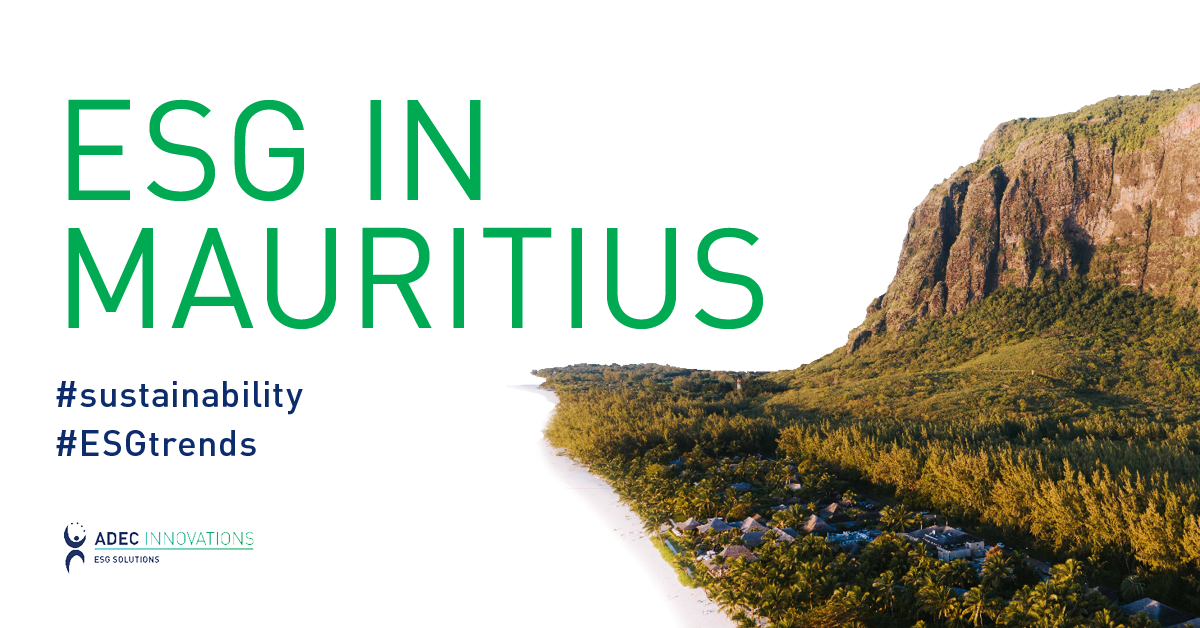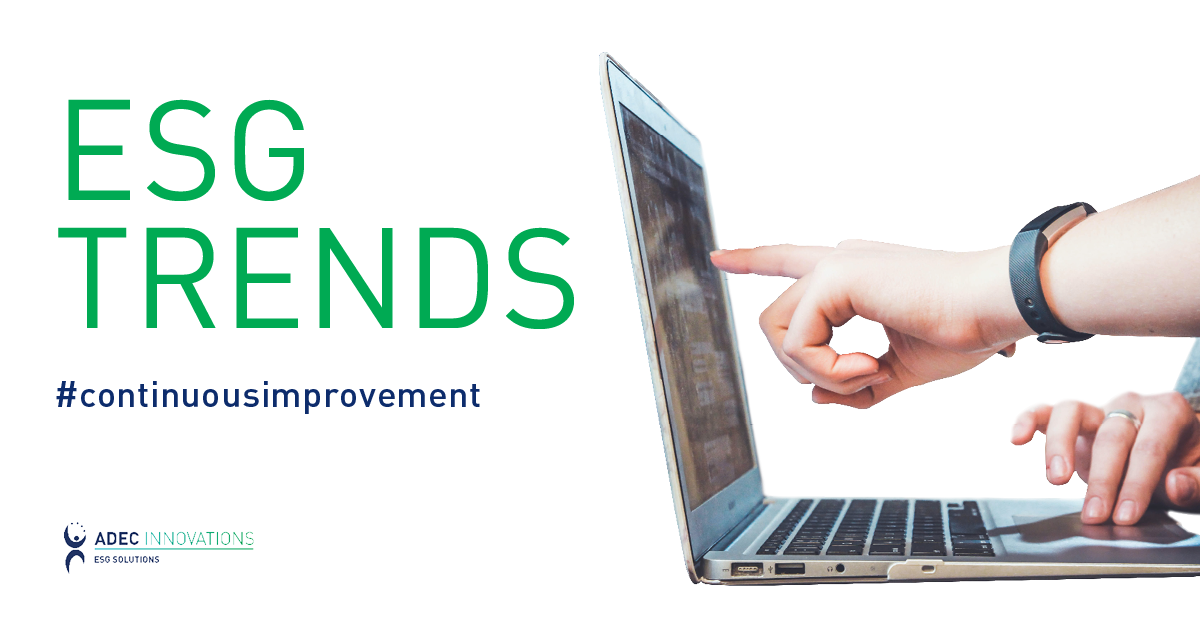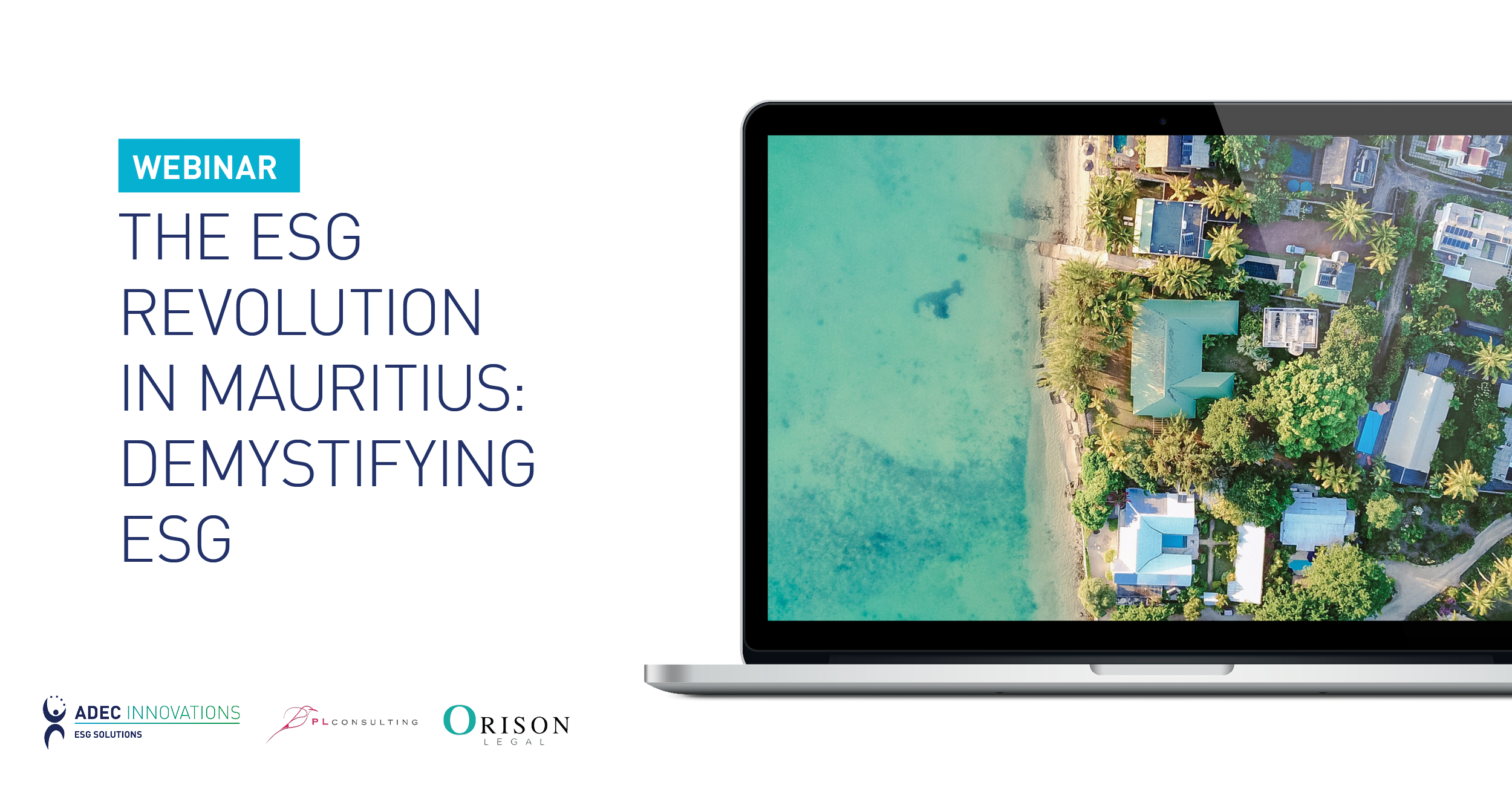Beginning Your ESG Journey in Mauritius (Webinar Recap)
In part two of our webinar series on the ESG revolution in Mauritius and beyond, ADEC ESG Solutions, PL Consulting, and Orison Legal were joined by three innovators in the Mauritian ESG space. The discussion focused on global and regional ESG trends, the ESG regulatory landscape, legal frameworks, and how one company created and implemented its own sustainability framework.

By Kendal Moir
December 29, 2021
In part two of our webinar series on the ESG revolution in Mauritius and beyond, ADEC ESG Solutions, PL Consulting, and Orison Legal were joined by three innovators in the Mauritian ESG space. The discussion focused on global and regional ESG trends, the ESG regulatory landscape, legal frameworks, and how one company created and implemented its own sustainability framework.
Keep reading for a brief summary of some of the main points, or view the full discussion here.
Just getting started with our webinar series on ESG in Mauritius? Check out part one, The ESG Revolution in Mauritius: Demystifying ESG.
ESG’s global influence grows more each day, with risk management, stricter requirements, and investor interest on the rise.
For many communities and organizations, COVID has highlighted vulnerabilities and given them a chance to experiment with new and innovative solutions. It’s brought risk management to the forefront of conversation through risk factors that remain out of our control.
This has further led to a realization that more robust frameworks are necessary to assess and mitigate risk and has sparked a renewed focus on the social and engagement-related dimensions of sustainability as well as governance and climate-related issues.
Risk has also been top-of-mind amongst investors. An analysis from global investment management firm BlackRock found that the vast majority of ESG funds outperform their traditional counterparts, with MSCI reporting that 15 out of 17 sustainable indices outperformed broad market counterparts.
Consequently, investors are putting pressure on industries and organizations to improve ESG programs, build resiliency plans, and increase transparency, with a push towards greater ESG integration.
ESG is a key part of global organizations—and Africa is no exception.
As we shift our focus to Africa as a region, Stephane Brabant (Senior Partner, Trinity International LLP) introduced the idea that for businesses, compliance with international ESG standards is hardly optional. ESG principles such as human rights and anti-corruption are universal rather than regional, for example. ESG and financial reporting are also becoming legal requirements in a growing number of countries. Further, ESG is proven to lead to long-term profitability, making a logical case for implementing and/or improving your organization’s ESG programs. Stephane also highlighted the rise of blockchain as an important tool for real-time, reliable data.
Mauritius has become a key leader in ESG, providing a rich environment for businesses that prioritize sustainability to thrive.
Mickael Apaya (Head of Sustainability and Inclusive Growth, Business Mauritius) explained that what started off as philanthropic measures within Mauritius has grown into a robust corporate social responsibility (CSR) and sustainability framework over the past several decades.
Most recently, in 2020, Business Mauritius—an association representing over 1200 local businesses—launched its SigneNatir sustainability pact. This initiative is composed of five key commitments dedicated to connecting businesses with the environment in which they operate, including:
- A shift to a low-carbon economy
- Engagement in a circular economy
- The protection of biodiversity
- Dedication to vibrant communities through safety measures and the preservation of cultural and historical heritage
- The adoption of inclusive development practices
Panelist Tania Li (Partner, Orison Legal) also highlighted ways that Mauritius’ financial market supports sustainability and transparent business practices. Launched in 2015, the Stock Exchange of Mauritius (SEMSI) requires that companies consider sustainability in order to meet its criteria for inclusion. These criteria are based on the Global Reporting Initiative’s (GRI) guidelines and were created with the aim of encouraging companies to improve their sustainability performance.
Case study: ENL’s Sustainability Journey
ENL Group, a diversified leader in sustainable value creation across numerous sectors, is one of the largest companies within Mauritius and has pushed to integrate sustainability into the way it does business across multiple industries. Sandra Fayolle, Head of Business Strategy and Investor Relations, joined fellow panelist Pascale Leonide (Founder and CEO, PL Consulting) in a focused discussion on what motivates ENL and how the company has managed to drive change within itself and the industries in which it operates.
ENL began by laying out a foundation for its ESG strategy. The four key areas of change around which its initiatives align are:
- The circular economy
- Innovation and adaptability
- Local anchoring and socio-economic development
- Skills and employment
It was important to ENL that its sustainability policies were driven by its people, so internal ESG champions from each team and dedicated sustainability committees were established. The company also created an internal sustainability brand, ensuring that the responsibility for ESG values came from within itself in order to make an impact both inside and out. And to drive change within its community, the company built the ENL Foundation more than a decade ago, focusing on community development and partnering with other organizations.
ESG is a universal concept. Climate action, community development, accountability, and transparency are at the forefront of every discussion across dinner tables, around board rooms, and at conferences around the world. Every industry in every country has an interest in seeing the ESG space grow as businesses begin to emphasize the value of long-term, sustainable thinking. Have you taken the next step on your Sustainability Journey?
Want more than just the highlights? We take a deeper dive into each topic on the full webinar. Watch the recording, including a Q&A session with the audience, by clicking here.
Related Articles
Webinar, ESG, sustainable business
By John Kester III on December 23, 2021
CDP | Webinar | ESG
By Kendal Moir on October 7, 2021
Webinar | Sustainable Development Goals | ESG | sustainable business
By Christel Calilung on April 15, 2021
ESG | National Park Week
Be a sustainability leader.
Our team supports you no matter where you are on your Sustainability Journey. Talk to us today to learn more.




